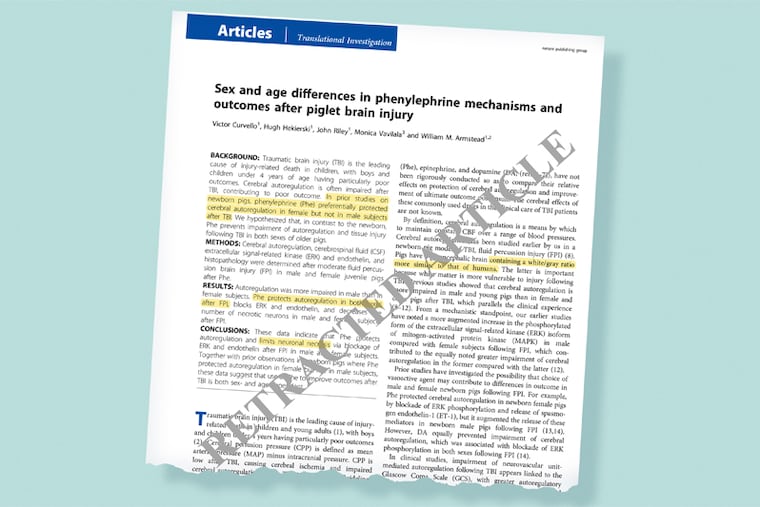An ex-Penn scientist falsified studies on pigs and agreed to a 7-year research ban, federal officials say
William Armstead left Penn during the 2021-2022 academic year. He used pigs to test possible brain-injury treatments for humans.

Federal officials have found that a longtime University of Pennsylvania scientist repeatedly engaged in research misconduct, falsifying results from experiments in which his lab tested drugs on pigs with brain injuries.
William M. Armstead, who left Penn during the 2021-22 academic year, has agreed to a seven-year ban on conducting federally funded research as a result of the findings.
Armstead’s case was investigated by Penn officials, then reviewed by the Office of Research Integrity in the U.S. Department of Health & Human Services, which released a summary of the findings on July 3. The outcome was first reported by the science news site Retraction Watch.
The investigation did not fault how Armstead and his lab members injured the pigs’ brains in order to study possible treatments for human brain injury. But investigators found some of the results were deliberately misrepresented in five published studies, so the animals’ injuries served no purpose, said Retraction Watch cofounder Ivan Oransky, a physician who teaches medical journalism at New York University.
In one of the studies under investigation, Armstead and his coauthors described the technique they used to injure the pigs’ brains. They drilled a hole in each animal’s skull, placed a cylinder of fluid against the exposed outer layer of the brain, then delivered a “pressure pulse” to the brain by striking the other end of the cylinder with a weighted pendulum.
“A bunch of pigs were subjected to some pretty terrible conditions for no reason,” Oransky said.
A man who answered a home phone number associated with the name William Armstead declined to comment.
Asked for more details on the investigation, a Penn Medicine spokesperson provided the same statement that the university gave when asked about the case in September. It read, in part:
“When a journal made us aware of inconsistencies in data submitted by Dr. Armstead, we evaluated the concerns in accordance with our process and reported our findings to all appropriate agencies. Dr. Armstead is no longer a faculty member at Penn, has closed his lab and ended his animal research activities.”
» READ MORE: Brain-injury researcher leaves Penn amid investigation into pig studies
Falsified images
In some cases, Armstead’s team falsely presented results from past experiments as new findings, by simply relabeling old images that showed the pigs’ blood vessels and brain cells after injury, according to the summary that federal officials provided of Penn’s investigation.
That description suggests that the scientists were attempting to make a drug look more effective than it was, Oransky said.
Armstead knowingly included 51 falsified or fabricated figures in five published studies, three grant applications, and a review article, among other research documents, according to the announcement.
Four of the five studies already have been retracted by the journals that published them.
Armstead was a research associate professor of anesthesiology and critical care at Penn’s Perelman School of Medicine, according to the federal summary of Penn’s investigation. He started work at the university in 1992, according to a resumé formerly posted on the website of a neuroscience research society.
Investigations into possible research misconduct are generally handled by the university where they are alleged to have taken place. Findings are then reviewed by the HHS Office of Research Integrity.
In many cases, scientists are allowed to continue conducting research under supervision. Outright bans, such as Armstead’s, are less common, Oransky said.